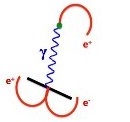A Journey into a Black Hole Collision
Moderators: kiore, Blip, The_Metatron
•
46 posts
• Page 1 of 3 • 1, 2, 3
A Journey into a Black Hole Collision
Black holes have been largely theoretical until the LIGO observations announced earlier this year. Thanks to those observations, we now have another way to study and observe these amazing celestial objects.
-

DoctorE - THREAD STARTER
- Posts: 11067
- Age: 64


Re: A Journey into a Black Hole Collision
The thread title reminds me of my first marriage.
"You have to be a real asshole to quote yourself."
~ ScholasticSpastic
~ ScholasticSpastic
-

ScholasticSpastic - Name: D-Money Sr.
- Posts: 6354
- Age: 48

- Country: Behind Zion's Curtain

Re: A Journey into a Black Hole Collision
Actually, the video's assertion that NOTHING can escape a black hole isn''t strictly correct, even disregarding Hawking evapoation. I'm thinking of a space rocket approaching a super-massive BH. In this case, it is physically plausibe for the rocket to cross the event horizon (where the gravity is not so strong as to tear everything apart), but then direct its thrust so as to escape again. This is something that ordinary particles cannot do, as they do not have their personal rocket motors. Of course, this doesn't work for stellar-mass black holes which would tear any rocket (and its crew) apart before they could get near the horizon.
May The Voice be with you!
- DavidMcC
- Name: David McCulloch
- Posts: 14913
- Age: 70

- Country: United Kigdom

Re: A Journey into a Black Hole Collision
Interesting. Can you cite a reputable source that gives the basis for this idea that it's possible to escape from the event horizon of a supermassive black hole? The closest I've been able to find is a 2007 paper (PDF) that presents a hypothesis that a rocket that has passed the event horizon of a supermassive black hole will be able to survive longer if it fires than if it simply falls. No mention is made of the possibility of actually escaping.
Serious, but not entirely serious.
-

SkyMutt - Posts: 856
- Age: 65

- Country: United States
Re: A Journey into a Black Hole Collision
I read from a non-reputable forum post once that, once you cross the event horizon, all possible paths in your future light cone terminate at the singularity.
Here we go again. First, we discover recursion.
- VazScep
- Posts: 4590

Re: A Journey into a Black Hole Collision
VazScep wrote:I read from a non-reputable forum post once that, once you cross the event horizon, all possible paths in your future light cone terminate at the singularity.
Yes, "event horizon" usually means the absolute horizon - the boundary of the set of points for which light emitted there can escape to infinity. So when you cross this boundary you're destined to get singularified. In order to say where this horizon is, you need to know the entire future evolution of the spacetime (otherwise the singularity might disappear before you get to it).
A soul in tension that's learning to fly
Condition grounded but determined to try
Can't keep my eyes from the circling skies
Tongue-tied and twisted just an earthbound misfit, I
Condition grounded but determined to try
Can't keep my eyes from the circling skies
Tongue-tied and twisted just an earthbound misfit, I
-

twistor59 - RS Donator
- Posts: 4966


Re: A Journey into a Black Hole Collision
twistor59 wrote:VazScep wrote:I read from a non-reputable forum post once that, once you cross the event horizon, all possible paths in your future light cone terminate at the singularity.
Yes, "event horizon" usually means the absolute horizon - the boundary of the set of points for which light emitted there can escape to infinity. So when you cross this boundary you're destined to get singularified. In order to say where this horizon is, you need to know the entire future evolution of the spacetime (otherwise the singularity might disappear before you get to it).
^You sound just like Data....
Scarlett and Ironclad wrote:Campermon,...a middle aged, middle class, Guardian reading, dad of four, knackered hippy, woolly jumper wearing wino and science teacher.
-

campermon - RS Donator
- Posts: 17444
- Age: 54


Re: A Journey into a Black Hole Collision
Cheers! So, if you could thrust away, could you wait around until the black hole evaporates enough that you're outside the event horizon?twistor59 wrote:VazScep wrote:I read from a non-reputable forum post once that, once you cross the event horizon, all possible paths in your future light cone terminate at the singularity.
Yes, "event horizon" usually means the absolute horizon - the boundary of the set of points for which light emitted there can escape to infinity. So when you cross this boundary you're destined to get singularified. In order to say where this horizon is, you need to know the entire future evolution of the spacetime (otherwise the singularity might disappear before you get to it).
Here we go again. First, we discover recursion.
- VazScep
- Posts: 4590

Re: A Journey into a Black Hole Collision
twistor59 wrote:VazScep wrote:I read from a non-reputable forum post once that, once you cross the event horizon, all possible paths in your future light cone terminate at the singularity.
Yes, "event horizon" usually means the absolute horizon - the boundary of the set of points for which light emitted there can escape to infinity. So when you cross this boundary you're destined to get singularified. In order to say where this horizon is, you need to know the entire future evolution of the spacetime (otherwise the singularity might disappear before you get to it).
Do we have any idea what happens when two event horizons overlap?
Do the two singularities instantly combine? Would anything caught between be instantly ripped in half? Would that generate huge energy through fission? If there is anything that is indivisible, would that hang between the two bh's enduring unimaginable tidal forces?
Freedom's just another word for nothin' left to lose,
And nothin' ain't worth nothin' but it's free.
"Suck me off and I'll turn the voltage down"
And nothin' ain't worth nothin' but it's free.
"Suck me off and I'll turn the voltage down"
-

trubble76 - RS Donator
- Posts: 11205
- Age: 47


Re: A Journey into a Black Hole Collision
Penis shaped gravity ways, isn't it?trubble76 wrote:twistor59 wrote:VazScep wrote:I read from a non-reputable forum post once that, once you cross the event horizon, all possible paths in your future light cone terminate at the singularity.
Yes, "event horizon" usually means the absolute horizon - the boundary of the set of points for which light emitted there can escape to infinity. So when you cross this boundary you're destined to get singularified. In order to say where this horizon is, you need to know the entire future evolution of the spacetime (otherwise the singularity might disappear before you get to it).
Do we have any idea what happens when two event horizons overlap?
Do the two singularities instantly combine? Would anything caught between be instantly ripped in half? Would that generate huge energy through fission? If there is anything that is indivisible, would that hang between the two bh's enduring unimaginable tidal forces?
Here we go again. First, we discover recursion.
- VazScep
- Posts: 4590

Re: A Journey into a Black Hole Collision
DavidMcC wrote:Actually, the video's assertion that NOTHING can escape a black hole isn''t strictly correct, even disregarding Hawking evapoation. I'm thinking of a space rocket approaching a super-massive BH. In this case, it is physically plausibe for the rocket to cross the event horizon (where the gravity is not so strong as to tear everything apart), but then direct its thrust so as to escape again. This is something that ordinary particles cannot do, as they do not have their personal rocket motors. Of course, this doesn't work for stellar-mass black holes which would tear any rocket (and its crew) apart before they could get near the horizon.
 If photons can't escape from the other side of the event horizon, even if they are emitted directly away from he singularity, how could a rocket escape seeing as it can't accelerate to faster than the speed of light? And what difference do you think it makes being a super-massive black hole as opposed to a stellar-mass black hole?
If photons can't escape from the other side of the event horizon, even if they are emitted directly away from he singularity, how could a rocket escape seeing as it can't accelerate to faster than the speed of light? And what difference do you think it makes being a super-massive black hole as opposed to a stellar-mass black hole?[Disclaimer - if this is comes across like I think I know what I'm talking about, I want to make it clear that I don't. I'm just trying to get my thoughts down]
-

minininja - Posts: 1597

Re: A Journey into a Black Hole Collision
VazScep wrote:Cheers! So, if you could thrust away, could you wait around until the black hole evaporates enough that you're outside the event horizon?twistor59 wrote:VazScep wrote:I read from a non-reputable forum post once that, once you cross the event horizon, all possible paths in your future light cone terminate at the singularity.
Yes, "event horizon" usually means the absolute horizon - the boundary of the set of points for which light emitted there can escape to infinity. So when you cross this boundary you're destined to get singularified. In order to say where this horizon is, you need to know the entire future evolution of the spacetime (otherwise the singularity might disappear before you get to it).
Yes, and by definition that means you were never inside the (absolute) event horizon!
A soul in tension that's learning to fly
Condition grounded but determined to try
Can't keep my eyes from the circling skies
Tongue-tied and twisted just an earthbound misfit, I
Condition grounded but determined to try
Can't keep my eyes from the circling skies
Tongue-tied and twisted just an earthbound misfit, I
-

twistor59 - RS Donator
- Posts: 4966


Re: A Journey into a Black Hole Collision
minininja wrote:DavidMcC wrote:Actually, the video's assertion that NOTHING can escape a black hole isn''t strictly correct, even disregarding Hawking evapoation. I'm thinking of a space rocket approaching a super-massive BH. In this case, it is physically plausibe for the rocket to cross the event horizon (where the gravity is not so strong as to tear everything apart), but then direct its thrust so as to escape again. This is something that ordinary particles cannot do, as they do not have their personal rocket motors. Of course, this doesn't work for stellar-mass black holes which would tear any rocket (and its crew) apart before they could get near the horizon.
If photons can't escape from the other side of the event horizon, even if they are emitted directly away from he singularity, how could a rocket escape seeing as it can't accelerate to faster than the speed of light? And what difference do you think it makes being a super-massive black hole as opposed to a stellar-mass black hole?
Photons can temporarily escape the event horizon (EH), actually. They just don't escape to a distance of many light years before being turned back in their orbit, so astronomers on earth don't get to see them. This means that an observer close enough to the event horizon can see some of the trapped photons.
On the issue of supermassive v. stellar, In have already mentioned the difference, but for your benefit, I repeat that the strength of gravity at the EH becomes weaker as the BH gets more massive. It has been established that gravity at the horizon of a galactic central BH is not strong enough to kill you, or presumably to overcome a rocket motor's thrust. The rule-of-thumb that "nothing can escape a black hole" only applies to "dumb" particles, not people. OTOH, a stellar-mass BH would have torn you and tyour ship apart, atom from atom, by the time you reached the EH.
Of course, there would tend to be so much trapped light around a BH that had been feeding, that you could expect to be cooked alive by the radiation anyway, in practice.
May The Voice be with you!
- DavidMcC
- Name: David McCulloch
- Posts: 14913
- Age: 70

- Country: United Kigdom

Re: A Journey into a Black Hole Collision
DavidMcC wrote:minininja wrote:DavidMcC wrote:Actually, the video's assertion that NOTHING can escape a black hole isn''t strictly correct, even disregarding Hawking evapoation. I'm thinking of a space rocket approaching a super-massive BH. In this case, it is physically plausibe for the rocket to cross the event horizon (where the gravity is not so strong as to tear everything apart), but then direct its thrust so as to escape again. This is something that ordinary particles cannot do, as they do not have their personal rocket motors. Of course, this doesn't work for stellar-mass black holes which would tear any rocket (and its crew) apart before they could get near the horizon.
If photons can't escape from the other side of the event horizon, even if they are emitted directly away from he singularity, how could a rocket escape seeing as it can't accelerate to faster than the speed of light? And what difference do you think it makes being a super-massive black hole as opposed to a stellar-mass black hole?
Photons can temporarily escape the event horizon (EH), actually. They just don't escape to a distance of many light years before being turned back in their orbit, so astronomers on earth don't get to see them. This means that an observer close enough to the event horizon can see some of the trapped photons.
On the issue of supermassive v. stellar, In have already mentioned the difference, but for your benefit, I repeat that the strength of gravity at the EH becomes weaker as the BH gets more massive. It has been established that gravity at the horizon of a galactic central BH is not strong enough to kill you, or presumably to overcome a rocket motor's thrust. The rule-of-thumb that "nothing can escape a black hole" only applies to "dumb" particles, not people. OTOH, a stellar-mass BH would have torn you and tyour ship apart, atom from atom, by the time you reached the EH.
Of course, there would tend to be so much trapped light around a BH that had been feeding, that you could expect to be cooked alive by the radiation anyway, in practice.
Established by who? Can you cite any sources? I've never heard anything like this and it doesn't make sense as far as I understand it.
[Disclaimer - if this is comes across like I think I know what I'm talking about, I want to make it clear that I don't. I'm just trying to get my thoughts down]
-

minininja - Posts: 1597

Re: A Journey into a Black Hole Collision
I can't get a reference, especiaslly as science on the internet has largelty disappeared behind paywalls, but also because all objects that encounter black holes are just dumb particles, without a rocket motor of their own - ie, they are simply falling under gravity. Unfortunately, most scientists have tended to ignore this, and not think out of the box about it. That is why they assume that anything that crosses the EH is forever trapped in orbit, even though that orbit tends to be elliptical, and therefore go outside the event horizon much of the time.
May The Voice be with you!
- DavidMcC
- Name: David McCulloch
- Posts: 14913
- Age: 70

- Country: United Kigdom

Re: A Journey into a Black Hole Collision
minininja wrote:DavidMcC wrote:minininja wrote:DavidMcC wrote:Actually, the video's assertion that NOTHING can escape a black hole isn''t strictly correct, even disregarding Hawking evapoation. I'm thinking of a space rocket approaching a super-massive BH. In this case, it is physically plausibe for the rocket to cross the event horizon (where the gravity is not so strong as to tear everything apart), but then direct its thrust so as to escape again. This is something that ordinary particles cannot do, as they do not have their personal rocket motors. Of course, this doesn't work for stellar-mass black holes which would tear any rocket (and its crew) apart before they could get near the horizon.
If photons can't escape from the other side of the event horizon, even if they are emitted directly away from he singularity, how could a rocket escape seeing as it can't accelerate to faster than the speed of light? And what difference do you think it makes being a super-massive black hole as opposed to a stellar-mass black hole?
Photons can temporarily escape the event horizon (EH), actually. They just don't escape to a distance of many light years before being turned back in their orbit, so astronomers on earth don't get to see them. This means that an observer close enough to the event horizon can see some of the trapped photons.
On the issue of supermassive v. stellar, In have already mentioned the difference, but for your benefit, I repeat that the strength of gravity at the EH becomes weaker as the BH gets more massive. It has been established that gravity at the horizon of a galactic central BH is not strong enough to kill you, or presumably to overcome a rocket motor's thrust. The rule-of-thumb that "nothing can escape a black hole" only applies to "dumb" particles, not people. OTOH, a stellar-mass BH would have torn you and tyour ship apart, atom from atom, by the time you reached the EH.
Of course, there would tend to be so much trapped light around a BH that had been feeding, that you could expect to be cooked alive by the radiation anyway, in practice.
Established by who? Can you cite any sources? I've never heard anything like this and it doesn't make sense as far as I understand it.
I don't know, but it isn't controversial.
Perhaps part of the problem is that you have been mislead by the media reports in New Sceientist, etc.
There is no entrance-only "brick wall" around a BH.
May The Voice be with you!
- DavidMcC
- Name: David McCulloch
- Posts: 14913
- Age: 70

- Country: United Kigdom

Re: A Journey into a Black Hole Collision
DavidMcC wrote:I can't get a reference, especiaslly as science on the internet has largelty disappeared behind paywalls, but also because all objects that encounter black holes are just dumb particles, without a rocket motor of their own - ie, they are simply falling under gravity. Unfortunately, most scientists have tended to ignore this, and not think out of the box about it. That is why they assume that anything that crosses the EH is forever trapped in orbit, even though that orbit tends to be elliptical, and therefore go outside the event horizon much of the time.
Challenge to the forum: spot the sentence in there that's correct....
A soul in tension that's learning to fly
Condition grounded but determined to try
Can't keep my eyes from the circling skies
Tongue-tied and twisted just an earthbound misfit, I
Condition grounded but determined to try
Can't keep my eyes from the circling skies
Tongue-tied and twisted just an earthbound misfit, I
-

twistor59 - RS Donator
- Posts: 4966


Re: A Journey into a Black Hole Collision
What is wrong with the first sentence, twistor?
May The Voice be with you!
- DavidMcC
- Name: David McCulloch
- Posts: 14913
- Age: 70

- Country: United Kigdom

Re: A Journey into a Black Hole Collision
Also:
https://en.wikipedia.org/wiki/Supermassive_black_hole
https://en.wikipedia.org/wiki/Supermassive_black_hole
Since the volume of a spherical object (such as the event horizon of a non-rotating black hole) is directly proportional to the cube of the radius, the minimum density of a black hole is inversely proportional to the square of the mass, and thus higher mass black holes have lower average density. In addition, the tidal forces in the vicinity of the event horizon are significantly weaker for massive black holes.
May The Voice be with you!
- DavidMcC
- Name: David McCulloch
- Posts: 14913
- Age: 70

- Country: United Kigdom

Re: A Journey into a Black Hole Collision
DavidMcC wrote:Also:
https://en.wikipedia.org/wiki/Supermassive_black_holeSince the volume of a spherical object (such as the event horizon of a non-rotating black hole) is directly proportional to the cube of the radius, the minimum density of a black hole is inversely proportional to the square of the mass, and thus higher mass black holes have lower average density. In addition, the tidal forces in the vicinity of the event horizon are significantly weaker for massive black holes.
But hang on... tidal forces are not the same as gravitational force. Tidal force is about the gradient of gravitational force i.e. the difference in force between your head and your toes. Super massive black holes might not spaghettify you until you've passed the event horizon, but that doesn't stop the gravitational force within the event horizon being sufficient to stop light and everything else from escaping.
[Disclaimer - if this is comes across like I think I know what I'm talking about, I want to make it clear that I don't. I'm just trying to get my thoughts down]
-

minininja - Posts: 1597

46 posts
• Page 1 of 3 • 1, 2, 3
Return to Astronomy & Space Science
Who is online
Users viewing this topic: No registered users and 1 guest